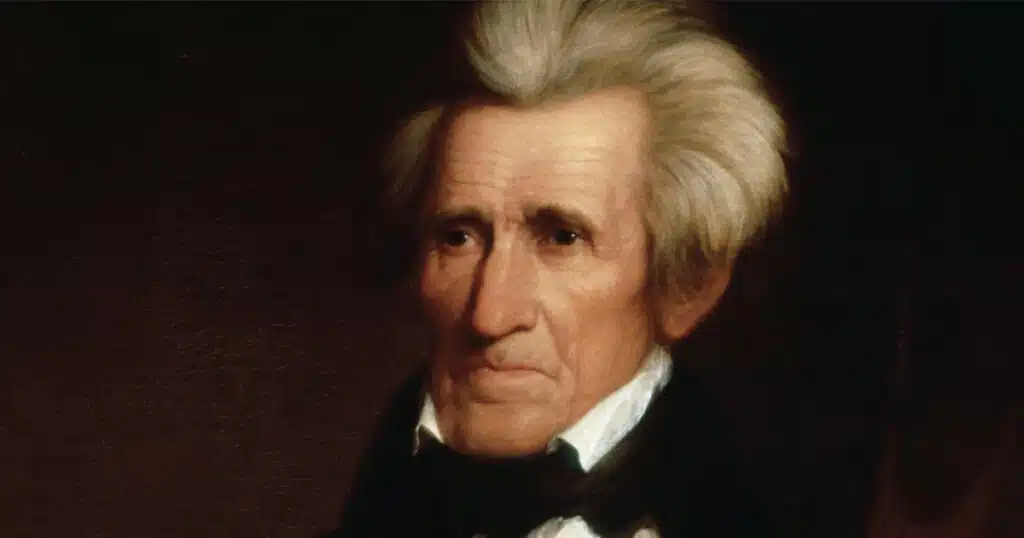
Revisiting the Jacksonian Foreign Policy
There is an apparent rift in the “MAGA movement.” It’s not actually a new divide and in this case it is at least partially magnified by foreign-sourced, bot-driven activity on social media, particularly on X.
The reality is there has long been somewhat of a fault line in the Republican party between those who have been labeled “isolationist” and those who have been labeled “neocons.”
Given the sometimes vicious attacks by both sides over President Trump’s long-standing policy of preventing Iran from obtaining nuclear weapons–something he has held as a core belief since announcing his candidacy for president in 2016–now seems an opportune time to remind everyone that most conservative Americans fall neither with the dovish Ron Paul-Tucker Carlson isolationists or the Lindsay Grahams of the neoconservatives.
Fortunately there is a clear alternative but it has not received enough airtime to become commonly known: a Jacksonian Foreign Policy.
Center for Security Policy Senior Fellow Caroline Glick ably articulated this alternative way back in 2011 when neoconservatives banded with the Obama administration to support Muslim Brotherhood rebellions in Egypt and Libya.
Much of what Glick described is exactly where most American conservatives stand on national security and foreign policy and it is worth repeating now:
“…it is certainly true that the neoconservatives and the isolationists are not the only foreign policy wings in the Republican Party. Indeed, most Republicans are neither isolationists nor neoconservatives.
Isolationism broadly speaking is the notion that the US is better off withdrawing to fortress America and leaving the rest of the world’s nations to fight it out among themselves. The isolationist impulse in the US is what caused the US to enter both world wars years after they began. It is what has propelled much of the antiwar sentiment on the far Left and the far Right alike since September 11. The far Left argues the US should withdraw from world leadership because the US is evil. And the far Right argues that the US should withdraw from world leadership because the world is evil.
Neoconservatism broadly speaking involves the adoption of a muscular US foreign policy in order to advance the cause of democracy and freedom worldwide. Wilsonian in its view of the universal nature of the human impulse to freedom, neoconservatives in recent years have wholeheartedly embraced the notion that if given a chance to make their sentiments known, most people will choose liberal democracy over any other form of government.
Aside from their belief that if given the choice people will choose to be free, neoconservatives argue the more democratic governments there are, the safer the world will be and the safer the US will be. Therefore, broadly speaking, neoconservatives argue that the US should always side with populist forces against dictatorships.
While these ideas may be correct in theory, in practice the consequence of Bush’s adoption of the neoconservative worldview was the empowerment of populist and popular jihadists and Iranian allies throughout the Middle East at the expense of US allies.
####
In truth, the dominant foreign policy in the Republican Party, and to a degree, in American society as a whole, is neither neoconservativism nor isolationism. For lack of a better name, it is what historian Walter Russell Mead has referred to as Jacksonianism, after Andrew Jackson, the seventh president of the US. As Mead noted in a 1999 article in The National Interest titled “The Jacksonian Tradition,” the most popular and enduring US model for foreign policy is far more flexible than either the isolationist or the neoconservative model.
According to Mead, the Jacksonian foreign policy model involves a few basic ideas. The US is different from the rest of the world, and therefore the US should not try to remake the world in its own image by claiming that everyone is basically the same. The US must ensure its honor abroad by abiding by its commitments and maintaining its standing with its allies. The US must take action to defend its interests. The US must fight to win or not fight at all. The US should only respect those foes that fight by the same rules as the US does.
THE US president that hewed closest to these basic guidelines in recent times was Ronald Reagan.
Popular perception that Reagan was acting in accordance with Jacksonian foreign policy principles is what kept the public support for Reagan high even as the liberal media depicted his foreign policy as simplistic and dangerous.
Throughout his presidency, Reagan never shied away from trumpeting American values. To the contrary, he did so regularly. However, unlike the neoconservatives, Reagan recognized that advancing those values themselves could not replace the entirety of US foreign policy. Indeed, he realized that the very notion that values trumped all represented a fundamental misunderstanding of US interests and of the nature and limits of US power.
Ronald Reagan’s national security and foreign policy can be summed up in 3 words:
Peace Through Strength
President Trump himself has repeated those 3 words often, in both speeches and on social media. No one can accuse either Reagan or Trump of being neoconservatives. But clearly neither can be aligned with the Tucker Carlson-Ron Paul fringe of the conservative movement.
This applies with regard to Iran.
Both President Reagan and President Trump used force against Iran during their presidencies. Both recognized that the theocracy in Iran was a threat to US security. Through Reagan’s Operation Praying Mantis in 1988, the US Navy sent much of the Iranian Navy to the bottom of the Persian Gulf. In 2020, President Trump ordered the air strike that took out Qasen Soleimani, the commander of the Islamic Revolutionary Guards Quds Force, the Iranian unit most involved with training Jihadist terrorists around the world.
Today, President Trump has stated unequivocally that Iran must not be allowed to have nuclear weapons and that there can be no peace if Iran becomes a nuclear power. This is clearly in America’s interests because a nuclear armed Iran is a threat to America. Iran has had ballistic missiles capable of hitting Israel for well over a decade, but they continue to work on multi-stage rocketry. They don’t need multi-stage rockets to hit Israel. A multi-stage rocket is intercontinental. In other words, such a ballistic missile can reach America. Also keep in mind that Iran has been responsible through terrorist proxies for killing thousands of American GIs dating back to the early 1980s. Finally, Iran has a national holiday called Death to America Day.
In the intelligence preparation of the battlefield stage of warfighting, one starts with examining who the enemy says he is. Iran, through word and deed, has self-identified as a lethal enemy of America. Fortunately, we can trust President Trump to take the correct course of action at the appropriate time to protect America.
The Tucker Carlson segment will no doubt accuse me of calling for war. But that’s not what I am saying at all. Nor is it what President Trump is saying. But Peace Through Strength requires the willingness to use power when necessary. We can all be thankful that we have a president who understands that.



